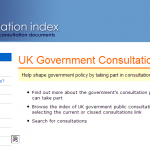Thanks to Jeremy for pointing out Harry Metcalfe‘s new ‘Tell Them What You Think‘, the latest mass screen-scraping exercise from the MySociety stable: this time, it’s government departments’ consultation exercises. I actually met Harry last week, but didn’t realise the project was actually ‘out there’. It bears all the classic MySociety hallmarks – which Harry should take as a great compliment.
Describing the story so far on the site’s own blog, he writes:
A few months ago, I responded to a couple of government consultations and, in the process, discovered there was no way to search all live consultations, or to be alerted when a new one was published. This struck me as more than a little mad.
 Except that, as web.archive.org demonstrates there was a central site listing live consultation exercises, at www.consultations.gov.uk from 2004 to early 2006. Did the site succeed in encouraging a new wave of civic engagement? Let’s put it this way: if it had, why would I be writing this? The site was then taken down, with the address redirecting into the Cabinet Office site.
Except that, as web.archive.org demonstrates there was a central site listing live consultation exercises, at www.consultations.gov.uk from 2004 to early 2006. Did the site succeed in encouraging a new wave of civic engagement? Let’s put it this way: if it had, why would I be writing this? The site was then taken down, with the address redirecting into the Cabinet Office site.
Today, it redirects to the BERR page on last year’s Consultation Policy Review. And – oh! the irony – if you look at their published response, you’ll find the following paragraphs:
3.21 Several responses called for a new approach to publicising consultation exercises, including suggestions for a single website for all central Government consultations with a facility to register for alerts.
3.23 The Better Regulation Executive will look into the feasibility of one website indexing all central Government consultation exercises and providing an automated alert system.
Visibility of current consultations is part of the problem, but I’d argue it’s a small – and maybe even negligible – part. I’m not even sure we know what they are trying to achieve: is it simply transparency of process? is it just ‘what we’re meant to do’? are we looking for huge volumes of responses?
And more pertinently, does the government really care what The Masses think? Harry almost acknowledges this himself to an extent, citing an example of a recent consultation which saw 85% outright opposition, and 91% disagreement with the phrasing of the question. What happened? The measure passed anyway.
We need to decide what we’re trying to achieve with consultation, then decide the best way to go about it. We’re a long, long, l-o-n-g way from there.
But there’s one important lesson from the exercise, as Jeremy notes. There are things you can do with your website to help the eage, public-spirited geeks take your information, and do something better with it. Ask them. And next time you spec up a website, make sure there’s a section on XML, RSS and/or API.
Response
I guess that perceived (lack of) demand is one of the barriers to doing anything about it? Not an excuse mind you.